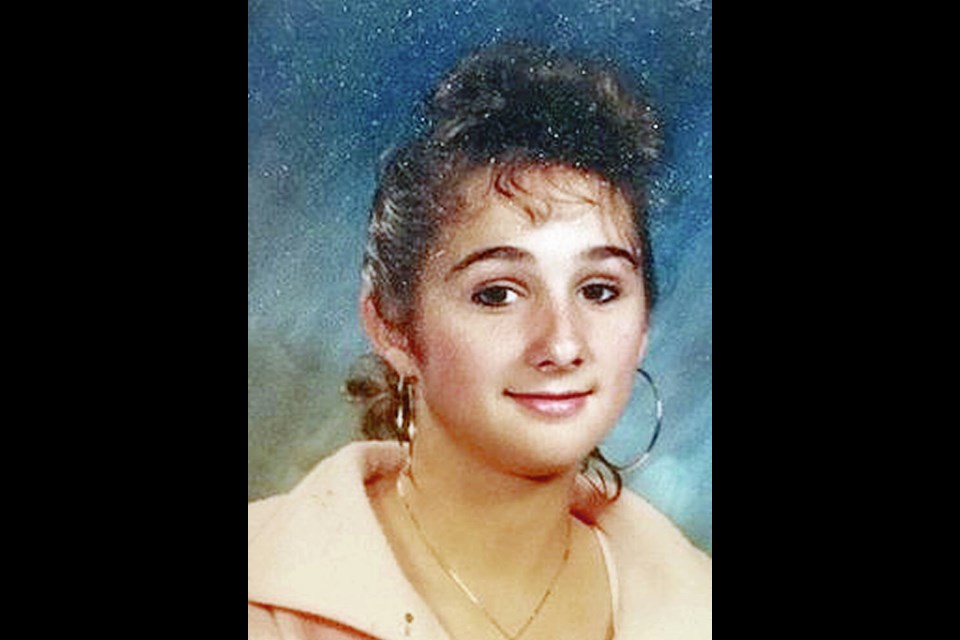Kimberly Gallup had just turned 17 when she was found strangled to death in a Victoria motel in November 1990.
She is one of three teen girls who were involved in sex work who were found dead on southern Vancouver Island within a year. Their deaths remain unsolved more than three decades later.
Kimberly, Melissa Nicholson and Cheri Lynn Smith are the focus of a new podcast by former CBC journalist Laura Palmer.
The first episode of Sweethearts, the sixth season of Palmer’s podcast, was released this past week, and dives into Kimberly’s life and death.
The teen, a Grade 11 student in Sidney at the time of her death, loved Bon Jovi, the Kansas City Chiefs football team and fashion.
She started to rebel as a young teenager, bouncing between living with her grandparents in Sidney and her dad’s Langford home, before eventually moving into a house with other girls her age near her dad.
At some point, her dad, Del Gallup, found out she was being sexually exploited, with a pimp that she called her boyfriend.
“I can’t even fathom how she got into what she was doing or why. It’s not something she would share with me,” Gallup says on the podcast.
On Nov. 21, 1990, between 2 a.m. and 3 a.m., Kimberly met a man on Government Street near Trounce Alley while out on the “Victoria stroll,” an area where sex workers gathered.
The man and Kimberly took a taxi to the Colony Motor Inn, a former motel on Douglas Street, where she shared a room known at the time as a “trick pad” with other girls, Palmer says in the episode.
A motel guest saw the man leaving the room and later that day, a friend of Kimberly went to the room and found her dead.
The man was not known to other sex workers.
At the time, Saanich police were investigating the death of 18-year-old Cheri Lynn in similar circumstances. Cheri Lynn was from Regina but ended up in sex work in Victoria after falling in love with a man at a carnival.
“He convinces her to move with him to Edmonton. And two weeks later, she’s on the street in Edmonton. It’s that fast. He’s lured her, pretending to be her boyfriend,” Palmer said in an interview.
About a year later, while six months pregnant, she was killed in Victoria after meeting a man in downtown Victoria. Her body was discovered in Saanich in the fall of 1990, Palmer said.
Both girls were picked up from around the same area and were strangled, Palmer says in the episode.
Forensic evidence links Kimberly’s death to the deaths of three Vancouver sex workers around the same time, an officer said at the time.
The second episode tells Cheri Lynn’s story, while the third centres on Melissa, who was 17 in June 1991 when she was killed. Her body was found in the Shawnigan Lake area. She was also in and out of sex work in Victoria and trying to get out at the time of her death, her family told Palmer.
Palmer believes the three cases could be linked.
At the time of the girls’ deaths, headlines described them as “teen hookers,” and a lot of reporting focused more on the nuisance of sex work than on the fact that teen girls were being manipulated by men pretending to be their boyfriends who lured them into sex work, Palmer said.
Today, the girls would be considered victims of sex trafficking, because they were too young to consent, she said.
It’s a stigma that has hurt the families of the victims.
“I would just like to erase the prostitute thing. Just a young lady that didn’t make it,” Gallup says in the podcast.
Palmer hopes the podcast series will bring new life to the cases. If they’re going to be solved, it will likely be through genetic genealogy, the process of using DNA evidence and genealogy to build a family tree and pinpoint a suspect, she said.
In later episodes, listeners will hear from experts in genetic genealogy, including a retired Calgary police officer who was one of the first to get a criminal conviction on a decades-old murder using genetic genealogy.
“It is still possible to solve these cases. And hopefully, that kind of work is happening now on these cases,” Palmer said.
The police departments investigating the cases told Palmer they remain open, but wouldn’t say anything more.
>>> To comment on this article, write a letter to the editor: [email protected]




